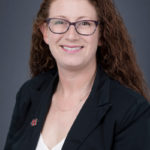THIBODAUX, La. — The Louisiana Board of Regents has awarded a Nicholls State University professor more than $69,000 to enhance molecular education in the Bayou Region.

The Board awarded Dr. Aimee Hollander, assistant professor of teacher education, $69,056 for the project. Dr. Hollander also serves as the program director for science secondary education and the Center for Teaching Excellence.
Through the project, Ellender Memorial Library will house a collection of magnetic 3D molecular models available to local biology and chemistry faculty. The grant will also fund professional development for area teachers and faculty to utilize these models in an effective manner. The grant will impact thousands of students, Dr. Hollander said, ranging from those at Nicholls to the area middle and high schools. The models will be available for checkout to faculty from Nicholls and local schools.
“So many foundational concepts in biology and chemistry are difficult to learn because they involve molecules too small to see with the eye,” Dr. Hollander said. “Now, students and teachers can use manipulatives to understand the properties of water, how DNA replicates and other important concepts.”
The grant money will provide training for educators on how to use the models to bring their classes in line with the Louisiana Science Standards. Those standards emphasize the use of models to teach matter structure, chemical reactions and information processing.
Dr. Hollander said educators can use the new models and the Makerspace in the library to advance learning around molecular modeling. She also hopes this will bring 3D modeling competitions to the Bayou Region to combine an interest in engineering with biology and chemistry.
“I have always wanted to provide my students with a more hands-on experience when learning biology and chemistry,” she said. “These models will be accessible to regional teachers for use anytime during the semester and provide an experience that cannot be provided otherwise.”


